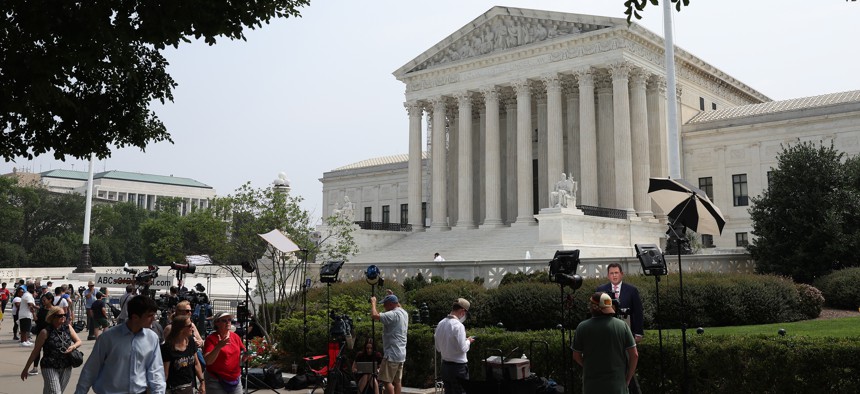Opinion
Bill Cotterell: Redistricting rulings will have ripple effects in Florida
If you follow the logic suggested by the Alabama and Louisiana voting rights cases, Florida’s congressional gerrymandering cannot stand, our Capitol Columnist writes.

Television news crews report from outside the U.S. Supreme Court on the last day of its term on June 30, 2023 in Washington, D.C. Photo by Kevin Dietsch/Getty Images
Oh, irony of ironies.
That same Supreme Court Democrats have been howling about for two decades — those black-robed arbiters who delivered the state’s decisive electoral votes to George W. Bush in 2020, stomped on the Voting Rights Act in 2013, took away constitutional protection of abortion last year and effectively ended affirmative action in college admissions — just might provide a path out of the Florida party’s self-inflicted suffering in the 2024 elections.
Recent columns by Bill Cotterell –
- Dignity of our highest court diminished by gifts
- Pot petition shows fallacy of signature campaigns
- New book looks at a Florida legal horror story
Except for the affirmative action bombshell at the end of the month, June was a tough time for Republicans in the nation’s highest court.
First came a ruling requiring Alabama to redraw its seven congressional districts so that Black voters — who make up about one-fourth of the electorate — have a realistic chance of electing a candidate of their choice to seats in the U.S. House. Black nominees (i.e., Democrats) have a plausible shot in just one of those Alabama districts now.
Then the justices told Louisiana to do something similar. The court lifted a hold on a case that could result in the Bayou State having to create a second minority-access district, among the six congressional seats it has.
And in perhaps the most important precedent of all, a 6-3 majority ruled against the “independent state legislature doctrine” in a North Carolina districting case. Conservative legal scholars had advanced the novel legal theory that state courts don’t have authority to review federal district boundaries drawn by state lawmakers. If you close one eye, tilt your head and wish real hard, it’s possible to find some constitutional basis for that — but Chief Justice John Roberts didn’t buy it.
Why all of this matters for Florida
The results from those three southern states indicate the conservative majority of the nation’s highest court is not totally in the tank for the most right-wing flights of Republican fancy. And, if you follow the logic suggested by the Alabama and Louisiana cases, Florida’s congressional gerrymandering cannot stand.
Our Republican-run state legislature drew districts in Florida that sent 20 Republicans and eight Democrats to Washington in 2022. Republican voters outnumber Democrats by about a half-million statewide, but there were some other reasons for the Democrats’ demise — mainly, they advocated stupid stuff and ran some candidates that could be charitably described as, well, unserious. Still, a partisan ratio of 2½-to-1 doesn’t just come about by chance.
Previous coverage – Redistricting plan sparks constitutional standoff
Worse, from a legal point of view, the legislators eliminated one Black district in North Florida and seriously diluted minority voting strength in another area. Former U.S. Rep. Al Lawson, a Democrat from Tallahassee, lost to Republican Neal Dunn of Panama City, to the surprise of absolutely no one.
As if to erase any doubt of the purely partisan motives behind that arrangement, the Legislature first enacted a remapping plan that included a Black district in north Florida, as had been mandated by courts in the previous round of redistricting 10 years ago. Gov. Ron DeSantis vetoed that one and demanded the plan that gave Lawson no real chance of beating Dunn — and the Legislature complied.
So now there are two lawsuits, one in federal court and the other in state court, challenging Florida’s congressional redistricting. Stripped of all the lawyerly language the state can put forth in court, Florida is in the unenviable position of arguing, “Hey, we didn’t cheat to help the white guy win, we cheated to help Republicans win their campaigns.”
Who knows? It might work. But if the trend shown by the Supreme Court’s rulings in the Alabama, North Carolina and Louisiana cases is any indicator, it’s more likely the federal courts will add Florida to the list of losers.
Aside from offering the Democrats a glimmer of hope to start a bit of recovery in Florida, these cases have implications far beyond our borders. House Speaker Kevin McCarthy’s grip on the gavel depends on a four-vote Republican majority — depending on how Reps. Matt Gaetz, Majorie Taylor Greene, Lauren Boebert and their ilk feel on a given day — so the GOP will have no seats to spare next year.
Bill Cotterell is a retired Capitol reporter for United Press International and the Tallahassee Democrat. He can be reached at bcotterell@cityandstatefl.com.
NEXT STORY: Bill Cotterell: Dignity of our highest court diminished by gifts
